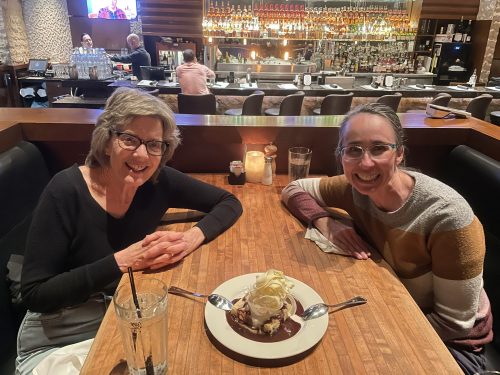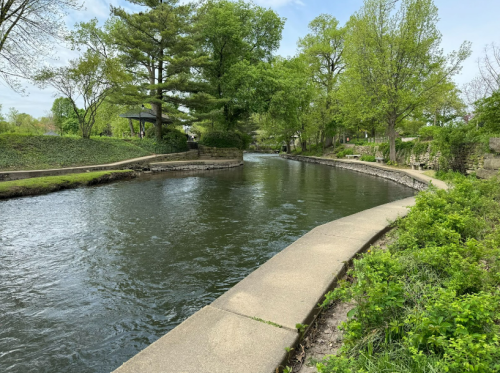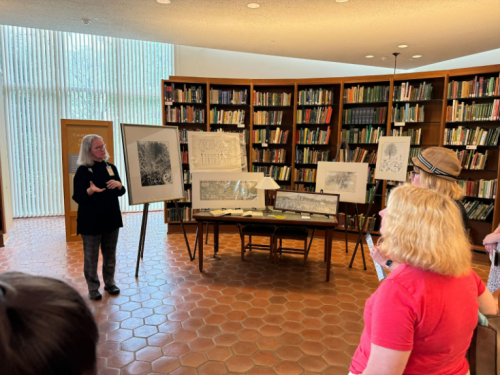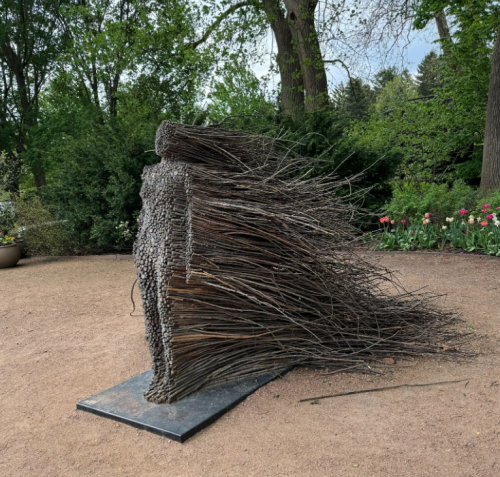This year’s LOEX Conference was held in Naperville, Illinois – about 30 miles west of Chicago. The LOEX committee weaved Naperville’s connection to trees into its theme: Branching Out: Growing and Adapting your Information Literacy Practice
We have to acknowledge that our meals both within and outside the conference were excellent! Most notable was the White Chocolate Grill’s signature White Chocolate Brownie!

Joy’s Highlights
I took an early flight on Thursday so I could spend a couple of hours exploring beautiful downtown Naperville, located about 3.5 miles from our conference hotel. Downtown Naperville features a Riverwalk which is one of the most beautiful places in the midwest. It has a small town feel with a rich assortment of upscale shops, including an Apple Store.

After lunch, I participated in a tour of The Morton Arboretum which was an official LOEX Pre-Conference Social Activity. We were given a 45 minute tour of the Arboretum Library led by the Arboretum Archivist. The Library includes 20,000 volumes primarily about botany and horticulture as well as a rich digital collection that focuses on the Arboretum, the Morton family, and the Morton Salt Company. The founder of the Arboretum was Joy Morton and his father was the person who founded Arbor Day. I left with a new respect for Morton Salt and this family’s love and care for trees! After the Library tour, there was a serious thunderstorm, but I took a couple of pictures before taking the early bus back to the hotel.


After the Arboretum visit, it was a pure delight to meet up with Colleen Foy! She is the best conference buddy ever. We kicked off our evening with an early dinner at the White Chocolate Grill, followed by a visit to the annual LOEX Meet & Greet. This year’s conference had 370 attendees from across the country. One of the best parts of LOEX is having the opportunity to meet and observe so many interesting instruction librarians!
Here are a few of my favorite breakout sessions:
- Uprooting the Research Process: Partnering with First-Year Writing to Cultivate Critical Source Evaluation. This session was led by Librarian Jessica Rardin and Writing Professor Ashley Burcheett from the University of Wyoming who were tasked with helping graduate assistant instructors teach source evaluation. They came up with their own tool, “IF I APPLY” which goes beyond the CRAAP test, but it does not include lateral searching used with SIFT evaluation. Their LibGuide includes a downloadable graphic as well as an instructor-led activity. I particularly enjoyed this workshop because they shared an entire Google Folder which includes their synthesis matrix as well as their annotated bibliography assignment instructions.
- Using the “Humble Inquiry” Approach to Cultivate Flourishing Librarian-Learner Relationships. Katie Odhner from Penn State Abington and Emily Reed from Penn State Harrisburg did a great job reminding us about the value of asking open-ended questions. One of the interesting phrases I heard several times throughout the weekend was “slow librarianship.” In a world of Generative AI and Mis- and Disinformation, librarians are doubling down on building relationships and the art of listening and asking questions. Here is a link to their LOEX Conference Proceedings article
- Generative AI: Teaching Students the Applications, Risks, Best Practices, and Alternatives. In this session, Tracy Coyne, librarian at Northwestern University walked us through a workshop for students their library offers on this topic. She began by defining Generative AI, and then introduced ways it is used and the positives and negatives related to those uses. She then introduced the CLEAR method for evaluating sources and included an introduction to academic sources (written by subject experts, include bibliographies, go through an editorial process, published by academic presses, etc.). She then showed the results of a variety of searches using AI versus Academic Library resources. It was very interesting! They used Bing Image Creator to design a children’s book cover with an orange fish and a sailboat. The results were very cute, but there was no attribution to the original artist. Here is a list of resources they have collected on this topic. I look forward to seeing the slides when they are posted on the LOEX conference site
Colleen’s Highlights
After seeing reports of LOEX being “the happiest place on earth,” I had to experience it for myself. With major development goals revolving around instruction this year, I had LOEX on the top of my list… and it did not disappoint. Furthermore, I have a new appreciation for #LibraryJoy. From choosing front row seats to 5pm dinners, Joy is my top travel buddy pick!
My favorite best breakout sessions included:
- Tackling the Nitty Gritty in Teach Search Strategies: A Visualized Approach from a Human Cognition Perspective. Research question-to-search strategy instructions are wide ranging and debatably beneficial among even advanced students. Yuqi He, a first-year STEM librarian at San Jose State University, shared an instructional technique grounded in Cognitive Theory to support student success when moving from research question to database searching. The session was not only informative but also reassuring. The question-to-search strategy template used in LIB220: Science Research and Sources Strategies includes 5 steps and aligns with the presenter’s overall framework. However, considering the Human Cognition-Based Approach, a maximum of four steps (or chunks) is ideal for process recollection and skill retention. In other words, I’m on it (!) and will incorporate this approach into an adapted framework to support future LIB220 student searching success.
- Picture This: Mapping and Visualizing Research Strategies to Support Developing Researchers. With an increasing amount of literature providing evidence of improved learning outcomes relative to visual elements in instructional sessions, presenters shared a “personal research cycle visualization” activity used in a Eastern Illinois University history research course. Students were prompted to draw the research cycle as they knew it before starting any research steps. They were then asked to update their original graphic as the semester progressed. What culminated was an evolutionary look at individual student acknowledgement of the research process and related skill development. Although I use graphic activities in my courses, I have yet to incorporate the longitudinal approach suggested in this session. I’m considering applying it to not only research cycle activities in LIB220 but also to health literacy activities in LIB290: Topics in Health Science Information.
- Unmasking the Hidden Curriculum: How it Negatively Impacts the One-Shot Model and First-Generation Low Income (FGLI) Students. This session proved to be revelatory and engaging by defining The Hidden Curriculum and offering examples and suggestions for any librarian – especially those who conduct one-shot sessions – to minimize its manifestation. Statistics show that FGLI students, although making up larger percentages of higher education populations each year, are still more likely to drop out when compared to peers from different socioeconomic backgrounds. By acknowledging the educational reinforcement of social inequalities according to student social class and intentionally fostering an environment that eliminates this structure, instructors can mitigate drop out rates and provide support to this population. Presenters suggested scheduling strategic and consistent office hours, including careful and mindful language in syllabi, and creating an environment where students are comfortable asking for help and debating grades. Check out their full list of resources.
ZSR cited at LOEX!
Elizabeth Ellis, Amanda Kaufman, and Megan Webb (otherwise known as Ellis et al., 2022) were cited at LOEX 2025! Winn W. Wasson, a Social Science Librarian from Syracuse University presented the breakout session Beyond Misinformation: Strategies and Tactics for Addressing the Growing and Pernicious Problem of the Misrepresentation and Misappropriation of Research. He shared the work of these (famous) ZSR Librarians from LOEX 2022 as support and inspiration for a workshop that educates faculty and students about contemporary issues that can compromise and politicize research findings.
LOEX 2025
Next year’s conference will be held in Pasadena, California – the city famous for hosting the Rose Bowl and the Tournament of Roses Parade. It will be interesting to see how the LOEX committee ties information literacy into the city’s history and culture.
Thanks to ZSR for making this opportunity and experience possible!


6 Comments on ‘Joy & Colleen at LOEX 2024 in Naperville, IL’
Sounds like it was a great conference with great sessions! Looking forward to Pasedena!
Love that the brownie got a shout out 🙂 Also cool to hear about what you both learned and how you can immediately begin to incorporate new ideas! Will definitely check out the FGLI materials and see how those ideas might apply to on-the-job training and mentorship of student assistants.
Glad to hear y’all had a great experience at LOEX! And finding a good conference travel buddy is the best. 🙂
Sounds very interesting. The source evaluation sites you linked to this post are amazing. Thank you for sharing!
It is apparent that you have a mutual admiration for each other as travel partners! I, too, have been hearing about slow librarianship, and think it is a concept we should adopt! Focusing on relationship building and mindful exploration of librarianship makes such sense and allows for greater career success and work/life balance. Kudos for the conference for bringing this concept forward!
What wonderful reports from you both! I’m fascinated by the “Slow Librarianship” discussion and the discussion of the hidden curriculum in one-shots! (and who knew Naperville had an APPLE STORE!)